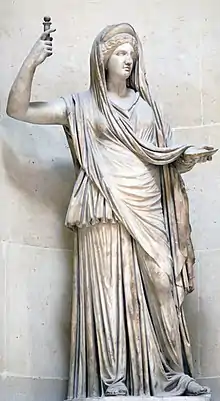Hera
English

Hera
Etymology
Borrowed from Latin Hēra, from Ancient Greek Ἥρᾱ (Hḗrā).
Pronunciation
- IPA(key): /ˈhɪəɹə/, /ˈhɪɹə/
- Rhymes: -ɪəɹə, -ɪɹə
Proper noun
Hera
Translations
queen of the gods, wife of Zeus
|
See also
References
- Oxford Dictionary of World Mythology, Arthur Cotterell, Oxford University Press, 1986
Catalan
Etymology
Borrowed from Ancient Greek Ἥρα (Hḗra).
Further reading
 Hera on the Catalan Wikipedia.Wikipedia ca
Hera on the Catalan Wikipedia.Wikipedia ca
Danish
Etymology
From Ancient Greek Ἥρα (Hḗra).
Pronunciation
- IPA(key): [ˈheːʁɑ], [ˈheːɐ]
Further reading
 Hera on the Danish Wikipedia.Wikipedia da
Hera on the Danish Wikipedia.Wikipedia da
Faroese
Usage notes
Matronymics
- son of Hera: Heruson
- daughter of Hera: Herudóttir
Declension
| Singular | |
| Indefinite | |
| Nominative | Hera |
| Accusative | Heru |
| Dative | Heru |
| Genitive | Heru |
Icelandic
Pronunciation
- IPA(key): /ˈhɛːra/
- Rhymes: -ɛːra
Declension
declension of Hera
| f-w1 | singular | |
|---|---|---|
| indefinite | ||
| nominative | Hera | |
| accusative | Heru | |
| dative | Heru | |
| genitive | Heru | |
Lithuanian
Etymology
Borrowed from Ancient Greek Ἥρα (Hḗra).
Maori
Related terms
Polish
Pronunciation
- IPA(key): /ˈxɛ.ra/
Audio (file) - Rhymes: -ɛra
- Syllabification: He‧ra
Declension
Further reading
- Hera in Polish dictionaries at PWN
Spanish
Etymology
Borrowed from Ancient Greek Ἥρα (Hḗra).
Pronunciation
- IPA(key): /ˈeɾa/ [ˈe.ɾa]
- Rhymes: -eɾa
- Syllabification: He‧ra
- Homophone: era
This article is issued from Wiktionary. The text is licensed under Creative Commons - Attribution - Sharealike. Additional terms may apply for the media files.
